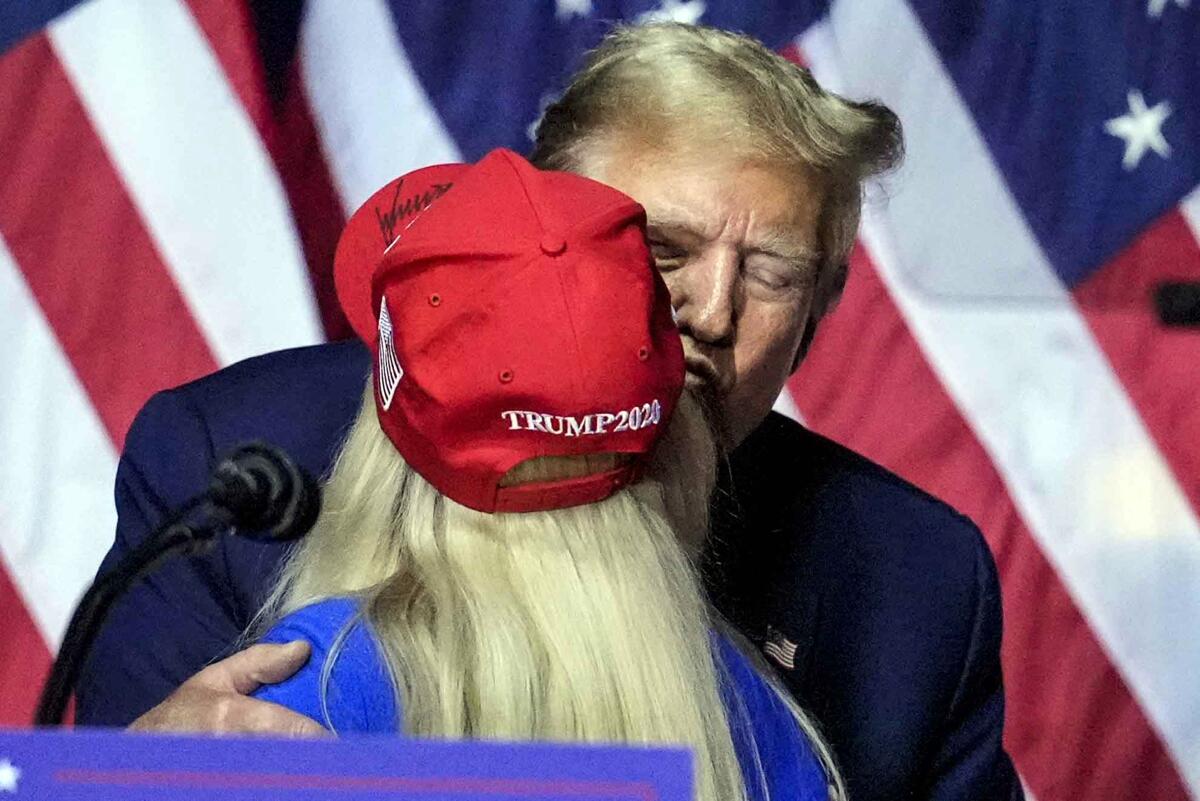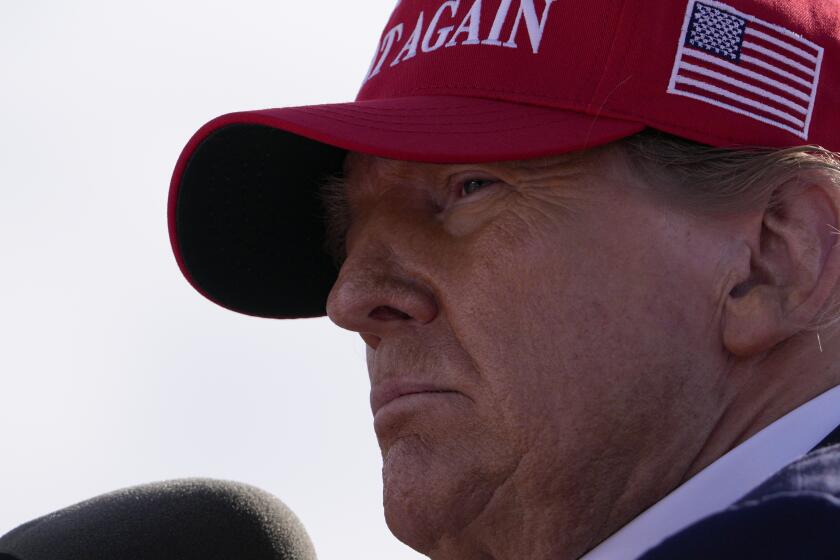Column: Why Trump’s running mate is less likely to be Marco Rubio than Marjorie Taylor Greene

- Share via
Now that Donald Trump is officially the presumptive Republican nominee, he’s getting ready for the general election. In just the last couple of weeks, he’s scratched a lot off his to-do list.
He installed new leadership, including his daughter-in-law, at the Republican National Committee and negotiated a joint-fundraising agreement with the party. His campaign is in talks with his former campaign manager and pardon recipient Paul Manafort to run the GOP convention. And his lawyers have successfully delayed the most serious legal threats he faces while getting a nearly half-billion-dollar bond in his fraud case reduced to a more manageable $175 million.
Yep, everything is shaping up as well as can be expected for Trump’s fourth run for president (including his widely forgotten and short-lived 2000 effort). The last big thing on his list: Pick a running mate.
It’s easy to misconstrue the ex-president’s comment in Ohio given his incoherence and history as well as the media’s biases. But it won’t help get Biden reelected.
In case you hadn’t heard, his former vice president, Mike Pence, is not available.
Picking a running mate is a lot like buying a car. The first question is, “What do you need it for?” If you need to haul around a bunch of kids, a minivan might be best. If you want to show off, a sports car makes more sense.
Veep picks are for shoring up weaknesses or reinforcing strengths. Trump picked Pence in 2016 because he needed to reassure social conservatives and evangelicals. Biden chose Kamala Harris because he believed (wrongly, in my opinion) that he needed a Black woman on the ticket.
The Super Tuesday primaries and change of national GOP leadership made the takeover official. Now the movement will have no one to blame but itself.
Sometimes the weaknesses have less to do with particular constituencies than with the perceived deficiencies of the presidential nominee. George W. Bush and Barack Obama respectively tapped Dick Cheney and Joe Biden to add decades of political experience to tickets headed by relatively young and inexperienced nominees.
So what does Trump need in a running mate this time around? His claims of uniting the GOP notwithstanding, he needs to deal with the reality that a quarter to a third of the party backed Nikki Haley (and other alternatives) in the primaries.
One way to do that is to win those voters back. Another is to replace them with supporters who haven’t traditionally voted Republican, including working-class Black and Latino voters. A third option: Cobble together chunks from columns A and B.
The question is, can a running mate help him do any of that? Trump is a known quantity, with 100% name identification. The idea that a sidekick could change voters’ opinions about him seems implausible.
Unlike in 2016, Trump may not have reason to shore up portions of the base with this decision. The voters Pence helped bring into Trump’s coalition are now for the most part fully loyal to him. Those who aren’t won’t change their minds based on a potential veep.
Hence my skepticism that picking a woman would shore up Trump’s weaknesses with female voters. Women who don’t like Trump, or who are highly motivated by the abortion issue, aren’t likely to be swayed by a female running mate.
There’s also the matter of Trump’s personal preferences. He now values blind loyalty and even blinder sycophancy more than electoral appeal. He’s convinced that he’s popular, and he wants someone to hype his greatness, not highlight his weaknesses.
Fortunately for Trump, there’s no shortage of candidates who meet those criteria. Florida Sen. Marco Rubio, who implored voters not to vote for a “con man” like Trump in 2016, now says he would be “honored” to be his No. 2.
Picking Rubio would make a lot of political sense. He’s a gifted and extremely flexible politician who could appeal to both college-educated suburbanites and working-class and Latino voters.
But I think Trump and his advisors understand that if he is elected, he could very easily be impeached again. In that light, selecting a conventionally reassuring politician as his constitutional understudy is risky. If removing Trump from office would result in a President Rubio — or even a President Tim Scott — a lot of Republicans might take that bargain. Also, Trump doesn’t want another Pence — a politician who, when truly tested by a constitutional crisis, sided with the Constitution.
What I believe Trump wants is a Renfield to his Dracula — a toady who is wholly subservient to his needs and desires. Such a creature — like Rep. Marjorie Taylor Greene, for example — would not only campaign the way Trump wants but would also make the price of removing him from the White House too scary to contemplate.
Greene herself might be too much of a liability to make the cut, but I suspect he will be drawn to a pliant enabler who is frightening enough to backstop his presidency while not so outlandish as to cost him the election. Nancy Mace, stay near your phone.
More to Read
A cure for the common opinion
Get thought-provoking perspectives with our weekly newsletter.
You may occasionally receive promotional content from the Los Angeles Times.













